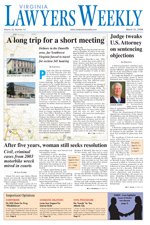This morning, the en banc 4th Circuit heard reargument in al-Marri v. Pucciarelli, the much-watched case that could set limits on presidential power to seize and hold civilians in the name of prosecuting the war on terrorism.
On June 11, a 4th Circuit panel granted a writ of habeas corpus to Ali al-Marri, a citizen of Qatar and legal resident of the U.S. who was seized in 2001 in Illinois by civilian authorities. The military took custody of al-Marri, who was initially detained for credit card fraud, after learning about his al-Qaida ties, which included training in a military camp in Afghanistan. Al-Marri filed his habeas petition from a Navy brig in South Carolina.
In the vacated panel decision, Judge Diana Motz and Judge Roger Gregory voted to issue the writ, while U.S. District Judge Henry Hudson dissented. Hudson was on the panel as a visiting district judge, and has no vote in the en banc case. The court’s remaining active judges, except Judge Dennis Shedd, joined Motz and Gregory today to rehear the case.
At regular intervals, the 4th Circuit judges described “what if” scenarios that went straight back to 9/11, questioning the lawyers about the legal framework now in place to stop another attack.
“If 25 or 30 terrorists sneak into this country,” couldn’t they be picked up under this authority, asked Judge Paul Niemeyer.
Jonathan Hafetz, al-Marri’s lawyer, said the president has the authority to repel sudden attacks, but that authority does not allow the indefinite detention of a legal resident alien such as al-Marri. Hafetz maintained that presidential police powers and authority as commander in chief support detention to halt an imminent attack, and that legislation passed since 9/11 – the Authorization for Use of Military Force and the Patriot Act – do not implicitly authorize indefinite detention.
Judge J. Harvie Wilkinson III acknowledged widespread concern that the AUMF “may have authorized some sweeping detention problem. …But people are not being swept off the streets of Omaha.”
“No, it was Peoria,” Motz noted.
Wilkinson continued. “The AUMF has been in force six years, and we’re talking about two individuals, Padilla and al-Marri. Both seem to have indisputable ties to al-Qaida. ... We’re not talking about a dragnet, a sweep, or an indiscriminate round-up. … Why does that kind of carefully targeted response by the government generate all this hoopla?”
Comparing detention of two people to the actions taken against German-Americans after World War I and against Japanese-Americans after World War II, Wilkinson asked if “we’ve lost our sense of perspective.”
“The calculus for determining constitutionality is not whether we have a good king or a bad king,” Gregory observed. “It’s not whether he stays his hand in generosity.”
Arguing for the government, Gregory Garre outlined the “extremely careful” procedures used in al-Marri to determine he was an enemy combatant. Garre said the government agencies on whose intelligence the president drew – the CIA, FBI and DOD – collected classified information and made both individual and collective assessments of the detainee’s status.
Garre also reinforced Wilkinson’s comment that al-Marri had available “channels to challenge a baseless seizure,” and that there were “no roadblocks put in his way to challenge” his transfer to military custody.
Al-Marri “squandered his opportunity to challenge” his custody, Garre said.
Richmond lawyer Margaret Sanner, who attended the argument, said debate among the judges and lawyers was “thoughtful and energetic” because “these judges had all done very serious homework” about the language of the relevant statutes and the precedents.
Sanger serves as counsel to a group of law professors from several Virginia and Ivy League schools that filed an amicus brief on behalf of al-Marri. She pointed particularly to questions by Judge William Traxler toward the close of argument that probed the “indefinite” nature of al-Marri’s detention.
“How does a person who’s held incommunicado challenge” his detention, Traxler asked.
Subscribe to:
Post Comments (Atom)

No comments:
Post a Comment